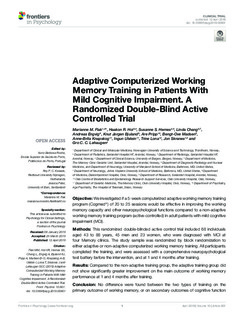Adaptive computerized working memory training in patients with mild cognitive impairment. A randomized double-blind active controlled trial
Flak, Marianne Møretrø; Hol, Haakon Ramsland; Hernes, Susanne M S; Chang, Linda; Engvig, Andreas; Bjuland, Knut Jørgen; Pripp, Are Hugo; Madsen, Bengt-Ove; Knapskog, Anne Brita; Ulstein, Ingun; Lona, Trine Eli.B.; Skranes, Jon Sverre; Løhaugen, Gro
Journal article, Peer reviewed
Published version

Åpne
Permanent lenke
http://hdl.handle.net/11250/2619532Utgivelsesdato
2019Metadata
Vis full innførselSamlinger
Sammendrag
Objective: We investigated if a 5-week computerized adaptive working memory training program (Cogmed®) of 20 to 25 sessions would be effective in improving the working memory capacity and other neuropsychological functions compared to a non-adaptive working memory training program (active-controlled) in adult patients with mild cognitive impairment (MCI).
Methods: This randomized double-blinded active control trial included 68 individuals aged 43 to 88 years, 45 men and 23 women, who were diagnosed with MCI at four Memory clinics. The study sample was randomized by block randomization to either adaptive or non-adaptive computerized working memory training. All participants completed the training, and were assessed with a comprehensive neuropsychological test battery before the intervention, and at 1 and 4 months after training.
Results: Compared to the non-adaptive training group, the adaptive training group did not show significantly greater improvement on the main outcome of working memory performance at 1 and 4 months after training.
Conclusion: No difference were found between the two types of training on the primary outcome of working memory, or on secondary outcomes of cognitive function domains, in this sample of MCI patients. Hence, the hypothesis that the adaptive training program would lead to greater improvements compared to the non-adaptive training program was not supported. Within group analyses was not performed due to the stringent RCT design.
